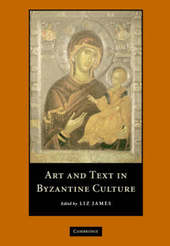
|
Art and Text in Byzantine Culture
Hardback
Main Details
| Title |
Art and Text in Byzantine Culture
|
| Authors and Contributors |
Edited by Liz James
|
| Physical Properties |
| Format:Hardback | | Pages:256 | | Dimensions(mm): Height 260,Width 185 |
|
| Category/Genre | Ancient and classical art BCE to c 500 CE
Byzantine and medieval art c 500 CE to c 1400 |
|---|
| ISBN/Barcode |
9780521834094
|
| Classifications | Dewey:709.0214 |
|---|
| Audience | | Professional & Vocational | |
|---|
| Illustrations |
8 Plates, unspecified; 48 Halftones, unspecified
|
|
Publishing Details |
| Publisher |
Cambridge University Press
|
| Imprint |
Cambridge University Press
|
| Publication Date |
11 June 2007 |
| Publication Country |
United Kingdom
|
Description
Art and Text in Byzantine Culture explores the relationship between images and words, and examines the different types of interactions between pictures and texts in Byzantine art. Byzantium is the only major world power to have experienced political upheaval on a vast scale as a result of an argument about art. Consequently, the dynamic between art and text in Byzantium is essential to understanding Byzantine art and culture. It allows us to explore the close linking of image and word in a society where the correct relationship between the two was critical to the well-being of the state. Composed of specially-commissioned essays written by an international team of scholars, this volume analyzes how the Byzantines wrote about art, how images and text work together in Byzantine art and how the words written on Byzantine artworks contribute to their meaning.
Author Biography
Liz James is Reader in Art History at the University of Sussex and Associate Director of the AHRC Centre for Byzantine Cultural History. She is the author of Empresses and Power in Early Byzantium.
Reviews'... beautifully produced, well edited and a pleasure to read. The nine essays it contains are of high quality, accompanied by copious notes placed at the end of each essay. There are also colour illustrations, an appendix of Greek texts, a selected bibliography, and an index. It is a work aimed at a readership of specialists and advanced students of the Byzantine Empire. Having said this, however, one needs to add that a general public too would find it rewarding reading.' Bryn Mawr Classical Review
|